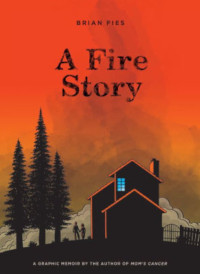Graphic Novels, February 1, 2019 | Xpress Reviews
Vibrant coloring and fascinating secondary stories create a gripping read that will attract graphic memoir fans; thoughtful and relatable, this touching account should be shared across generations; for fans of graphic biographies, 20th-century philosophy, historical leftist ideology, and current radical political movements
Week ending February 1, 2019
Fies, Brian. A Fire Story. ComicArts: Abrams. Mar. 2019. 160p. ISBN 9781419735851. $24.99; ebk. ISBN 9781683354512. MEMOIR
 Fies (Mom’s Cancer) here expands on an original short webcomic detailing the devastating impact of the 2017 northern California wildfires that destroyed his own home and entire communities. Drawing individuals in predominantly black and white and using heavily contrasting colors to depict a piece of clothing or other item that highlights a central focus on the page, Fies shows the emotional hollowness and extreme loss felt by all those who coped with the tragedy. Background colors convey the mood of family members and capture the essence of the environment (vivid greens and blues of happier times oppose harsh reds and dull greys of the flames and bureaucracy that followed during recovery). The inclusion of a few actual photos provides a documentary-like touch, further portraying the reality and costs of the catastrophe. Interstitial vignettes concerning other survivors round out the narrative and are often more compelling than the central story line.
Fies (Mom’s Cancer) here expands on an original short webcomic detailing the devastating impact of the 2017 northern California wildfires that destroyed his own home and entire communities. Drawing individuals in predominantly black and white and using heavily contrasting colors to depict a piece of clothing or other item that highlights a central focus on the page, Fies shows the emotional hollowness and extreme loss felt by all those who coped with the tragedy. Background colors convey the mood of family members and capture the essence of the environment (vivid greens and blues of happier times oppose harsh reds and dull greys of the flames and bureaucracy that followed during recovery). The inclusion of a few actual photos provides a documentary-like touch, further portraying the reality and costs of the catastrophe. Interstitial vignettes concerning other survivors round out the narrative and are often more compelling than the central story line.
VERDICT Vibrant coloring and fascinating secondary stories create a gripping read that will attract graphic memoir fans and anyone seeking firsthand accounts of surviving a natural disaster.—Evan M. Anderson, Kirkendall P.L., Ankeny, IA
Gharib, Malaka. I Was Their American Dream: A Graphic Memoir. Clarkson Potter: Crown. May 2019. 160p. ISBN 9780525575115. pap. $16.99; ebk. ISBN 9780525575122. MEMOIR
[DEBUT] Gharib, a first-generation American of Filipino and Egyptian descent, tells her life story in this heartwarming and engaging new graphic memoir. Growing up in Cerritos, CA, Gharib was the “perfect Filipino kid,” living with her mom during the year while navigating the customs of her father’s native Egypt in the summer. As the author begins to realize her own dreams and is accepted into a New York college, a world opens up that is vastly different from the one she experienced in her Southern California town. Along the way, she meets her future husband, Darren, who is not Muslim, much to her father’s chagrin, and ultimately chooses to embrace the traditions of both sides of her family and start new ones of her own. Expressive black-and-white illustrations, however sparse, add depth and emotion to full- and multipaneled pages.
VERDICT Thoughtful and relatable, this touching account should be shared across generations.—Traci Glass, Multnomah Cty. Lib., Portland, OR
Thorkelson, Nick. Herbert Marcuse: Philosopher of Utopia. City Lights. Mar. 2019. 132p. ed. by Paul Buhle & Andrew T. Lamas. ISBN 9780872867857. pap. $15.95. BIOG/PHIL
Cartoonist Thorkelson (The Earth Belongs to the People) presents the life of philosopher Herbert Marcuse (1898–1979), a German émigré who escaped the Nazi regime and fled to the United States and taught at a variety of universities. Marcuse was a student of philosopher Martin Heidegger and worked to advance a synthesis of Hegel and Marx that pushed for liberation from the crushing intellectual and spiritual domination of capitalism. His major works include One-Dimensional Man and Eros and Civilization, which are still part of college courses today. Marcuse believed in a life of play and joy, and Thorkelson’s somewhat cartoonish style befits this aspect despite the serious nature of the topic. Panels are rich in visual allusions, ranging from George Herriman’s Krazy & Ignatz comics to Eugène Delacroix’s painting Liberty Leading the People. Thorkelson further draws parallels with present-day left-wing concerns, enhancing the overall appeal for like-minded readers, assuming some familiarity with the personalities and philosophies of the intellectual left from the 1930s to the 1980s.
VERDICT For fans of graphic biographies, 20th-century philosophy, historical leftist ideology, and current radical political movements.—Evan M. Anderson, Kirkendall P.L., Ankeny, IA
RELATED
ALREADY A SUBSCRIBER? LOG IN
We are currently offering this content for free. Sign up now to activate your personal profile, where you can save articles for future viewing









Add Comment :-
Comment Policy:
Comment should not be empty !!!